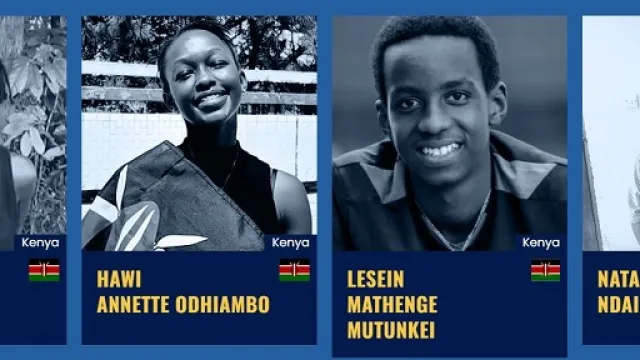Where smart ideas by Kenyan teens are taking off to the global stage

Where smart ideas by Kenyan teens are taking off to the global stage
Free from old habits, prejudices, and stereotypes, a mind in fresh bloom is naturally poised to see the world anew and come up with fresh innovations—solutions to problems that have oftentimes eluded others for years.
History is rich with accounts of scientific revolutions that were led by young minds.
For instance, at 23, Isaac Newton began inventing calculus while Albert Einstein published several of his critical papers when he was 26. Werner Heisenberg pioneered quantum mechanics in his mid-20s. At the time, these men were all inexperienced and immature, and yet they managed to transform their fields.
Kenya has never been short of brilliant ideas. Take Edith Chemutai a student who comes from Thika. She started a water conservation project and helped set up a water filtration system that helped reduce the dirty water swamp behind her school.
Through her work, Edith aims at curbing water shortage in the world and developing better conservation and purification methods for the commodity that is increasingly getting a global focus due to worsening weather patterns.
In Kenya's capital Nairobi, James Nyaga Ngatia has been developing iGuide, a mobile app that seeks to eradicate pornography, an awful vice that is eroding morals among millions of people.
In Kilifi, Kenya's coastal belt, Marietta Halima Kazungu has developed Rapidcovix Breathalyzer, medical equipment that helps people in rural areas who cannot afford the high costs of testing to better detect infectious diseases.
Natasha Njoki Ndai as well as Wema Wambugo Marandu both from Nairobi make five nominees from Kenya who were this year picked by RISE, an initiative of Schmidt Futures and the Rhodes Trust that scouts for smart projects run by brilliant teenagers across the world.
At the moment, the window is open for Kenyan teens aged between 15 and 17 years (as of July 1st, 2023) to join the Global Rise Community, a team of young global citizens who are keen on solving daunting challenges facing humanity through impactful projects. The winners get a set of lifetime benefits such as lucrative study scholarships.
The Rise Global Challenge is a brainchild of Schmidt Futures, a philanthropic initiative that brings talented people together to solve hard problems in science and society in partnership with the Rhodes Trust, an international education charity programme.
During the application, applicants are invited to demonstrate their passion and talent through videos, projects, and group interviews, allowing them to pitch projects aligning with their interests, abilities, and time availability.
The online applications are open on the Rise website and will remain open until January 25, 2023, at 19:59pm Kenyan time. Apply here
The program organisers, RISE, will leverage their expansive network comprising over 30 global organisations such as NBA Africa, the HALI Access Network, KenSAP, and Akili Dada in Kenya, to help aspirants without access to the internet.
Diana Njuguna, Head of Programs for Akili Dada, said: “Akili Dada is thrilled to continue growing our partnership with Rise in Kenya as we work together to nurture the next generation of young and innovative leaders looking to build a better world.”
Schmidt Futures CEO Eric Braverman said his organization will keep scouring the globe, seeking hidden brilliance.
“There are so many extraordinary people who could do so much more to make the world better if they only could find opportunity and each other. We hope to make the longest bet we can imagine on exceptional talent with perseverance, integrity, and care for others,” he said.
Braverman’s counterpart in Rhodes Trust, Elizabeth Kiss said, “Rise is an extraordinary opportunity for people from every corner of the world to embark on a lifelong journey of service and impact. Wherever you are, we encourage you to apply. You only know what you can achieve when you try.”
Since its inception, Rise has welcomed more than 150,000 people from over 170 countries to its community and selected 200 winners from 69 countries, with Kenya getting seven in the last two years.



